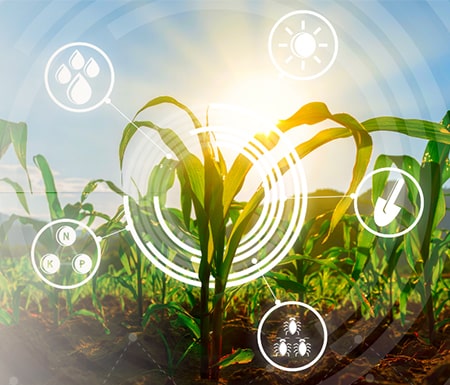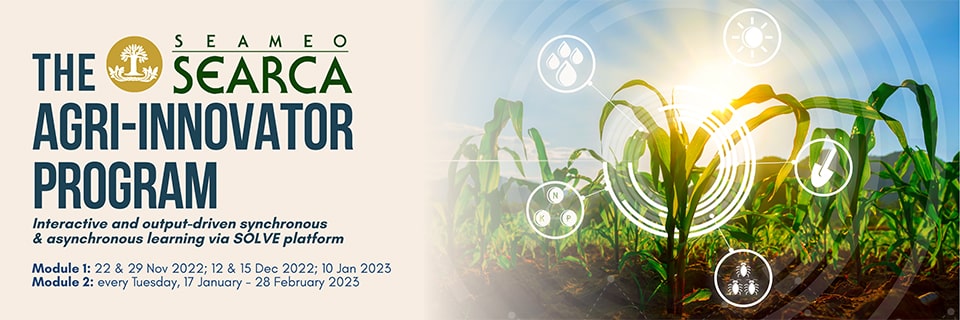
The Southeast Asian Regional Center for Graduate Study and Research in Agriculture (SEARCA) has embraced the rhythm of change and is aware of the increasing complexities, uncertainties, and nonlinearities of its constantly changing environment. To succeed in this era of change, the Center and its community of stakeholders need to acquire new mindsets and the right capabilities that will equip them for success in Agriculture 4.0.
The SEARCA Agri-Innovator Program is a non-formal short-term training program that supports the Center's 11th Five-Year Plan that sets out principles and objectives toward Accelerating Transformation Through Agricultural Innovation (ATTAIN).
Attendees will acquire a Design Thinking mindset and apply it using the Lean Startup methodology. These combinations of mindset and methodology will play a crucial role in helping the participants succeed in their agri-ventures. The Program aims to serve as a foundation of replicable training products that can be applied in various scenarios and formats for agri-innovation.
Contents
Who Should Apply?
Agri-entrepreneurs, representatives of farmer organizations and cooperatives, mid-level leaders, and staff of higher education institutions, government agencies, local government units, and nongovernment organizations are the intended participants of this Program. They should have identified an agriculture and rural development problem in their community and be ready with an innovation/innovative solution in mind to address it. They should be endorsed by their respective heads of institutions or organizations and have a prepared draft Re-entry Action Plan (REAP). The program will accept 25-30 participants.
Since English will be the primary mode of facilitating the program, participants are expected to have good English communication skills. While outputs are expected to be produced in English, participants are welcome to have version/s translated to their local language.
Program Objectives
At the end of this Program, participants should be able to perform the following human-centered techniques and advocate for the same within their communities:
- Empathize with their beneficiaries/customers: Participants will learn that what matters is not their idea but the people they want to help because success will weigh heavily on their ability to empathize.
- Clearly define problems worth solving: Articulate findings in an actionable and concise manner using personas and journey maps. Participants will be guided to prioritize which of the problems found need to be solved.
- Prototype and test: Create a tangible representation of their most promising idea and prepare it for testing. Participants will be encouraged to demonstrate the prototypes they created to target users and collect feedback.
- Rapid iteration: Participants will learn to use the feedback collected to generate insight, decide on changes needed, and how to move forward.
Expected Outputs
The expected outputs should include a framework for effective innovation that supports SEARCA's 11th Five-Year Plan:
Module 1
- Customer Personas
A semi-fictional archetype that represents the key traits of the participants' target audience based on data collected from research and interviews. - Journey Maps
A visualization of the process or actions that a person does or goes through in chronological order to accomplish a goal. - How Might We Statements (Problem/Opportunity)
Small but mighty questions that allow the reframing of insights into opportunity areas and innovate on problems found during user research. - Prioritized List of Ideas Based on Effort and Impact
A decision-making tool that helps people and teams manage their time more efficiently. Each potential idea, strategy, or project is assessed based on the level of effort required and the potential impact or benefits they will have if completed. - A Low Fidelity Prototype
This prototype can be created using paper or digital tools to make the idea tangible and allow for better feedback collection.
Module 2
- Re-entry and Sustainability Action Plans
Details the goals and work that need to be taken in order to achieve said goals based on the results of this module. - Lean/Business Model Canvas
A 1-page business plan template created by Ash Maurya that helps you deconstruct your idea into its key assumptions. It is adapted from Alex Osterwalder's Business Model Canvas and optimized for Lean Startups. - A Pitch Deck and 5-Minute Pitch
A presentation with accompanying slides to share and propose the refined idea to stakeholders. This pitch will include the key elements of the business plan and sustainability action plans.
Program Overview
This program is divided into two modules where an experiments-based iterative approach will be taken.
| Description | Topics | |
|---|---|---|
| Module 1 | Agri-Innovation Idea Generation In this module, learners immediately dive into learning the principles of successful innovation by applying them in the real world. Through a combination of live sessions, video recordings, articles, tools, and templates, step-by-step instructions are given together with a discussion of the principle being applied. Learners perform the activities as instructed and then discuss the results with peers during the live sessions to get feedback, find insights, and use it to refine and move forward with their ideas. By the end of this module, participants would have:
|
|
| Module 2 | Agri-Innovation Idea Validation Using the learning from the previous module, learners now learn how to take an iterative approach to develop their idea further. While step-by-step instructions to produce the output are still provided, live sessions with participants will be formatted in a group or 1on1 coaching manner. By the end of this module, participants would have been able to:
|
|
Program Duration and Platform
The Program will be conducted online via the SEARCA Online Learning and Virtual Engagements (SOLVE) Platform from 22 November 2022 to 28 February 2023.
Application Process
Interested applicants should be endorsed by their respective heads of institutions or organizations through a Statement of Commitment and have a prepared Re-entry Action Plan (REAP). The relevant forms may be downloaded through the links below:
The Application Form may be accessed at https://bit.ly/agriinnovatorapp, and the files for the Statements of Commitment and REAPs are to be uploaded in the provided platform.
Applications are extended until 4 November 2022.
*To download, click the link then go to File -> Download

